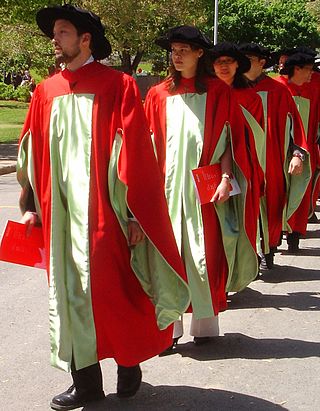
Postgraduate or graduate education refers to academic or professional degrees, certificates, diplomas, or other qualifications pursued by post-secondary students who have earned an undergraduate (bachelor's) degree.
An academic degree is a qualification awarded to students upon successful completion of a course of study in higher education, usually at a college or university. These institutions commonly offer degrees at various levels, usually including undergraduate degrees, master's, and doctorates, often alongside other academic certificates and professional degrees. The most common undergraduate degree is the bachelor's degree, although in some countries there are lower level higher education qualifications that are also titled degrees.

A doctorate, doctor's degree, or doctoral degree is a postgraduate academic degree awarded by universities and some other educational institutions, derived from the ancient formalism licentia docendi. In most countries, a research degree qualifies the holder to teach at university level in the degree's field or work in a specific profession. There are a number of doctoral degrees; the most common is the Doctor of Philosophy (PhD), awarded in many different fields, ranging from the humanities to scientific disciplines.

A Master of Science is a master's degree in the field of science awarded by universities in many countries or a person holding such a degree. In contrast to the Master of Arts degree, the Master of Science degree is typically granted for studies in sciences, engineering and medicine and is usually for programs that are more focused on scientific and mathematical subjects; however, different universities have different conventions and may also offer the degree for fields typically considered within the humanities and social sciences. While it ultimately depends upon the specific program, earning a Master of Science degree typically includes writing a thesis.

A thesis, or dissertation, is a document submitted in support of candidature for an academic degree or professional qualification presenting the author's research and findings. In some contexts, the word thesis or a cognate is used for part of a bachelor's or master's course, while dissertation is normally applied to a doctorate. This is the typical arrangement in American English. In other contexts, such as within most institutions of the United Kingdom and Republic of Ireland, the reverse is true. The term graduate thesis is sometimes used to refer to both master's theses and doctoral dissertations.
The Doctor of Education is a research or professional doctoral degree that focuses on the field of education. It prepares the holder for academic, research, administrative, clinical, or professional positions in educational, civil, private organizations, or public institutions.

Doctor of Medicine is a medical degree, the meaning of which varies between different jurisdictions. In the United States, and some other countries, the M.D. denotes a professional degree. This generally arose because many in 18th-century medical professions trained in Scotland, which used the M.D. degree nomenclature. In England, however, Bachelor of Medicine, Bachelor of Surgery was used and eventually in the 19th century became the standard in Scotland too. Thus, in the United Kingdom, Ireland and other countries, the M.D. is a research doctorate, honorary doctorate or applied clinical degree restricted to those who already hold a professional degree (Bachelor's/Master's/Doctoral) in medicine. In those countries, the equivalent professional degree to the North American, and some others use of M.D., is still typically titled Bachelor of Medicine, Bachelor of Surgery (M.B.B.S.). A provider who holds a Doctor of Chiropractic (D.C.) degree has a "doctoral" degree and sometimes can be referred to as a "doctor," but is not the same as a healthcare provider who holds a Doctor of Medicine (M.D.) degree since the M.D. degree confers much more authoritative clinical capacities, greater autonomy, and responsibility.

Yanshan University is a university in Qinhuangdao, Hebei, China under the provincial government. It has a student population of 39,000 and a staff population of 3,200. It is a national key school and runs state key labs on its campus.
A licentiate is an academic degree present in many countries, representing different educational levels. It may be similar to a master's degree when issued by pontifical universities and other universities in Europe, Latin America, and Syria.
The Doctor of Business Administration (DBA) is either a professional doctorate or a research doctorate, depending on the granting university, awarded on the basis of advanced study, examinations, project work, and research in business administration. The DBA is a terminal degree in business administration. Some universities also combine the business administration field with technology-related disciplines. Along with the PhD or DPhil, it represents the highest academic qualification in business administration, and is typically required to gain employment as a full-time, tenure-track university professor or postdoctoral researcher in the field. As with other earned doctorates, individuals with the degree are awarded the academic title doctor, which is often represented via the English honorific "Dr." or the post-nominal letters "DBA" or "DrBA."

In higher education, a comprehensive examination, often abbreviated as "comps", is a specific type of examination that must be completed by graduate students in some disciplines and courses of study, and also by undergraduate students in some institutions and departments. Unlike final examinations, comprehensive examinations are not linked to any particular course, but rather test knowledge across one or more general fields of study.
A terminal degree is the highest-level college degree that can be achieved and awarded in an academic discipline or professional field. In other cases, it is a degree that is awarded because a doctoral-level degree is not available nor appropriate.
The Master of Letters degree is a postgraduate degree.
The Doctor of Engineering, or Engineering Doctorate, is a degree awarded on the basis of advanced study and research in engineering and applied science for solving problems in industry. In the United States, it is a terminal professional doctorate. A DEng/EngD is equivalent to a PhD in engineering, but different in that it has a solid industrial base and an additional taught element. The degree is usually aimed toward working professionals.
A Master of Research degree is an internationally recognised advanced postgraduate research degree. In most cases, the degree is designed to prepare students for doctoral research. Increasingly, the degree may be useful for students considering careers outside of academia, where high-level research skills are valued but a doctoral qualification is not required.
The Doctor of Professional Studies is a doctoral degree for experienced professionals who wish to undertake a program that is applied in nature and of practical value to their career. The DProf is based on applied research of real world problems. The DProf has been available to graduate students in the United Kingdom since the 1980s. The first Doctor of Professional Studies program was started in 1972 at Pace University. As another form of research doctorate and a doctoral level academic qualification, the DProf is equivalent to the PhD in terms of academic level and rigour, with the difference between the two lying in the type of research conducted and consequently in the type of knowledge generated.
A magister degree is an academic degree used in various systems of higher education.

A Doctor of Philosophy is the most common degree at the highest academic level awarded following a course of study and research. PhDs are awarded for programs across the whole breadth of academic fields. Because it is an earned research degree, those studying for a PhD are required to produce original research that expands the boundaries of knowledge, normally in the form of a dissertation, and defend their work before a panel of other experts in the field. The completion of a PhD is often a requirement for employment as a university professor, researcher, or scientist in many fields. Individuals who have earned a Doctor of Philosophy degree use the title Doctor with their name, although the proper etiquette associated with this usage may also be subject to the professional ethics of their own scholarly field, culture, or society. Those who teach at universities or work in academic, educational, or research fields are usually addressed by this title "professionally and socially in a salutation or conversation." Alternatively, holders may use post-nominal letters such as "Ph.D.", "PhD", or "DPhil". It is, however, considered incorrect to use both the title and post-nominals at the same time.

A Doctor of Law is a degree in law. The application of the term varies from country to country and includes degrees such as the Doctor of Juridical Science, Juris Doctor (J.D.), Doctor of Philosophy (Ph.D.), and Legum Doctor (LL.D.).
In the United States, the PhD degree is the highest academic degree awarded by universities in most fields of study. American students typically undergo a series of three phases in the course of their work toward the PhD degree. The first phase consists of coursework in the student's field of study and requires one to three years to complete. This often is followed by a preliminary, a comprehensive examination, or a series of cumulative examinations where the emphasis is on breadth rather than depth of knowledge. The student is often later required to pass oral and written examinations in the field of specialization within the discipline, and here, depth is emphasized. After the comprehensive examination the student is a "PhD Candidate", which is the academic equivalent of a master's degree. Some universities will award terminal Master's for students who drop out of the PhD program at this stage, and some, like Columbia University and the Albert Einstein College of Medicine, award a Master's en route to the PhD. Some PhD programs require the candidate to successfully complete requirements in pedagogy or applied science.








